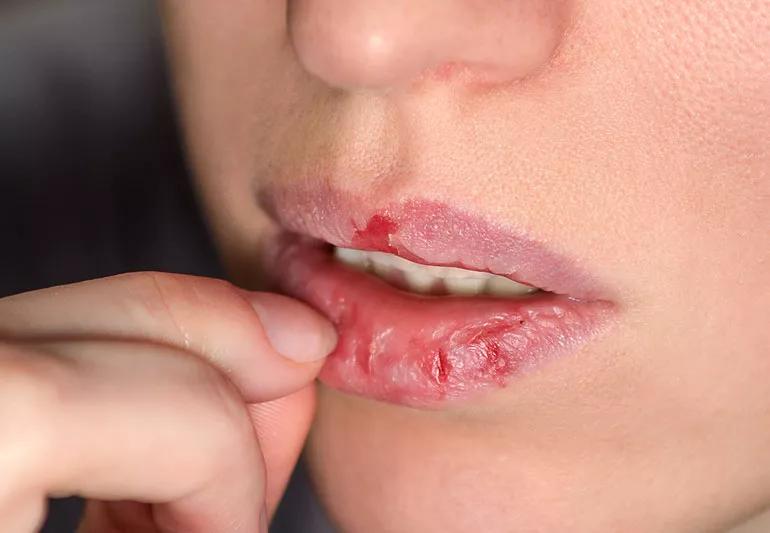Hiding it is common, but you can stop it

Image content: This image is available to view online.
View image online (https://assets.clevelandclinic.org/transform/6cc1cf4d-0b98-443f-b863-0af45f9a9363/pickingSkin-900475670-770x553_jpg)
Woman picking at the skin on her lips
Do you pick at your skin compulsively? Do you feel the need to hide the signs from others? If you have this problem and can’t seem to stop, you could have a skin-picking disorder, also called compulsive skin picking, dermatillomania, or excoriation disorder.
Advertisement
Cleveland Clinic is a non-profit academic medical center. Advertising on our site helps support our mission. We do not endorse non-Cleveland Clinic products or services. Policy
“Skin picking disorder (SPD) is more common than most people realize,” says preventive medicine physician and wellness expert Sandra Darling, DO. In fact, the International OCD Foundation estimates that 1 in 20 people have this condition.
That means that in an average-sized crowd at any major league baseball game in Chicago, San Francisco or St. Louis, nearly 2,000 people in the stadium are likely affected by SPD.
If you have this problem, you’re not alone, but it’s likely that you spend more time alone if you have SPD. If you’re like many sufferers, you may have visible sores and even scars from skin-picking behavior.
So you have a secret. And keeping that secret can lead you to isolate yourself from others. This can increase depression and anxiety, which creates a vicious cycle by triggering the urge to pick, Dr. Darling says.
“Most people who suffer from the disorder do not talk about it, and they rarely seek medical care because healthcare providers and loved ones often tell them to just stop,” she says. “They are very good at hiding the disorder because of shame and embarrassment.”
What’s most important is the understanding that, with time and effort, it is possible to overcome the behavior. For anyone who thinks they have SPD, Dr. Darling offers these tips:
“The first step,” according to Dr. Darling, “is acknowledging that skin picking is a problem and to stop hiding it. In order to heal, you need to release the shame associated with chronic picking. This can only happen once the behavior is out in the open.”
Advertisement
Your behavior may have started innocently enough — maybe you had a rash or a sore that you absentmindedly started picking at. Or maybe you worried at a hangnail or other loose skin around you nails because you were feeling stressed out. But then the picking made things worse and the cycle began.
In Dr. Darling’s experience, most people won’t benefit from treatment with typical antidepressants or medications for obsessive-compulsive disorder. Instead, she recommends seeking help from a therapist, but she also cautions that finding the right match for patient and therapist is very important.
“Ideally the therapist would be knowledgeable about body-focused repetitive behaviors (BFRBs), including skin picking,” Dr. Darling says. “A therapist trained in hypnotherapy can be helpful, as this technique is a powerful way to change ingrained behaviors and patterned thinking.”
She also notes that there are many resources available — locally and online — including therapists, skin-picking support groups and the TLC Foundation.
Reducing stress is a crucial component of healing. Toward that end, Dr. Darling suggests practicing stress management on a daily basis using techniques such as:
These relaxation techniques, along with a healthy diet, regular exercise and adequate sleep, provide an integrative approach to the treatment of skin picking disorder.
Those with SPD “typically go into a trance or ‘zone out’ while picking,” she says. “In order to overcome the behavior, it’s important to learn how to stay grounded in the present moment.”
Developing awareness through a regular mindfulness-based meditation practice can help you recognize skin-picking urges when they come up. Instead, you can choose to do something different in those moments such as going for a walk.
Dr. Darling’s final words of advice are for those who think they know someone who has SPD.
“Be compassionate and gentle with the person. Do not simply tell them to stop even if you have the best of intentions,” she says. “Understand that they want to stop, but are not able to.”
Advertisement

Sign up for our Health Essentials emails for expert guidance on nutrition, fitness, sleep, skin care and more.
Learn more about our editorial process.
Advertisement
Although it could be used as a moisturizer, this new trend is not recommended
It’s a great disinfectant for around your home, but not for your skin
Changes in texture, smell, color and performance are signs it’s time to throw the cosmetic item away
Strengthening your skin barrier, simple routines and minimizing products are ongoing, popular trends
Moisturizing, running a humidifier and adjusting your showers may help keep itchiness and irritation at bay
Glycolic acid benefits skin tone, texture and pigmentation by exfoliating dead skin
Some gentle soap and warm water go a long way when you’re washing these cosmetic tools regularly
New formulas are less drying and contain water-based and skin-loving ingredients
Prioritize your health by managing stress, strengthening your social connections and getting quality sleep
Bolsters, blankets, pillows and blocks can offer extra support, stability and comfort
Allergies, postnasal drip, asthma or reflux could be to blame for a cough that won’t quit